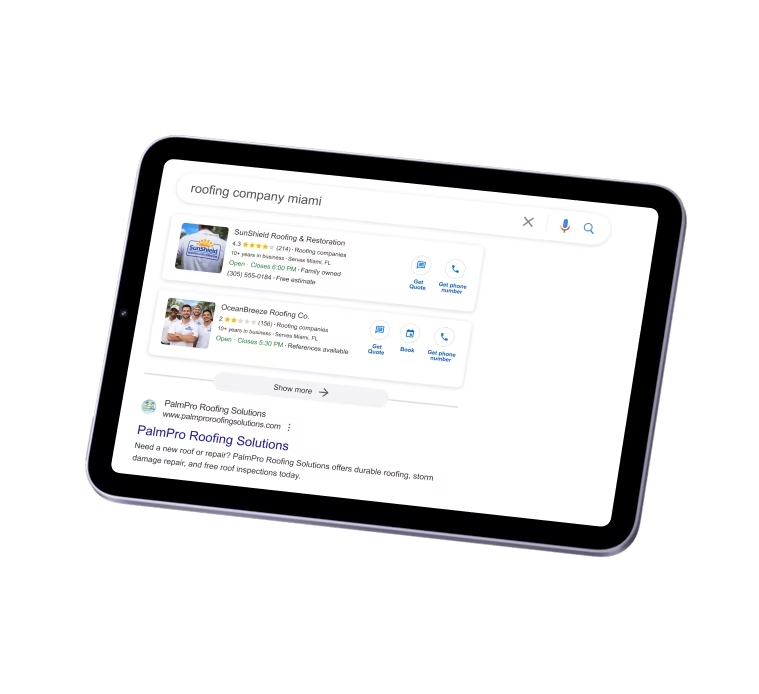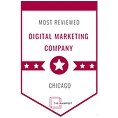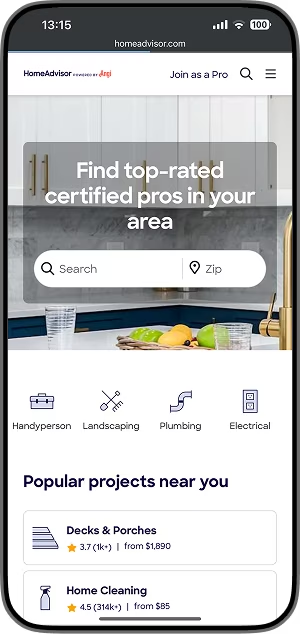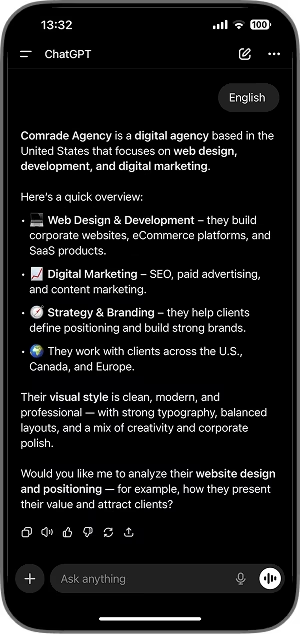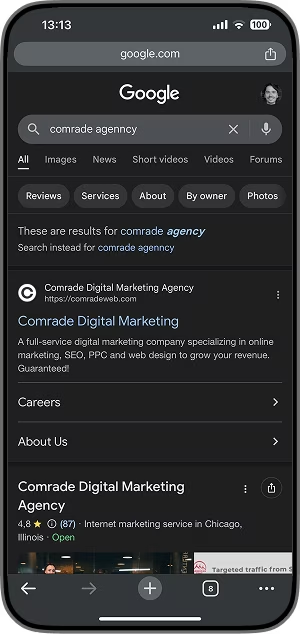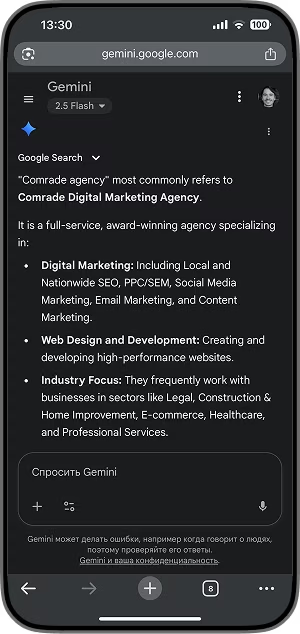How to Calculate PPC Return on Ad Spend (ROAS)
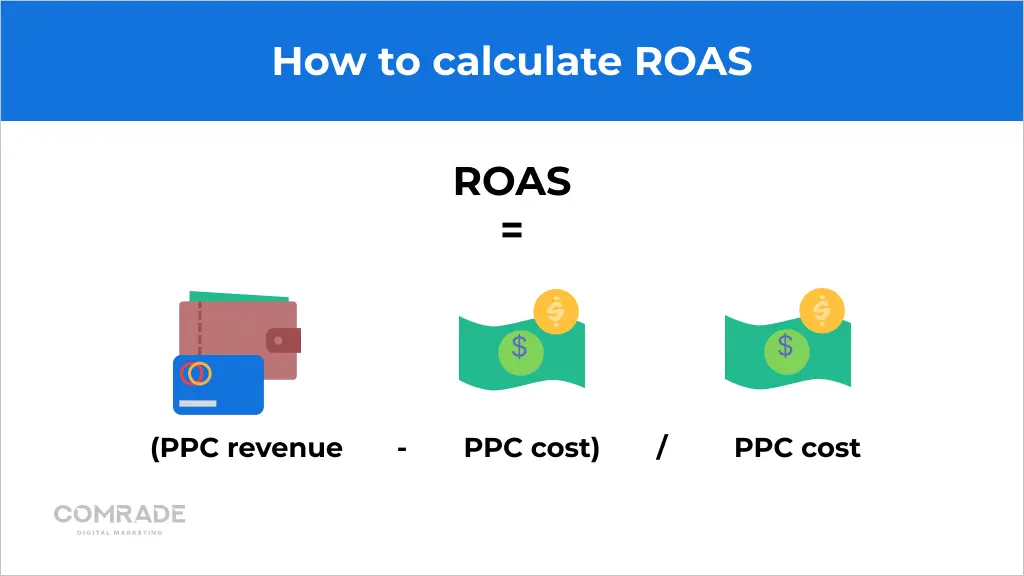
A lot goes into a comprehensive digital marketing plan. If we want to isolate PPC ads specifically and determine their ROI, we use the following formula:
(PPC Revenue – PPC Cost) / PPC Cost
The result is written as a percentage and shows the amount of revenue earned for every dollar spent on a PPC campaign. For example, if your PPC sales are $2,000, and you paid $500 as PPC click costs, the ROAS will be 300%. We use ROAS to calculate bid optimizations and ensure our clients are spending the optimal amount. Our PPC management services continuously optimize campaigns to lower the cost-per-click and acquire more customers for less money.
How Comrade Can Provide Pay-Per-Click Management for You
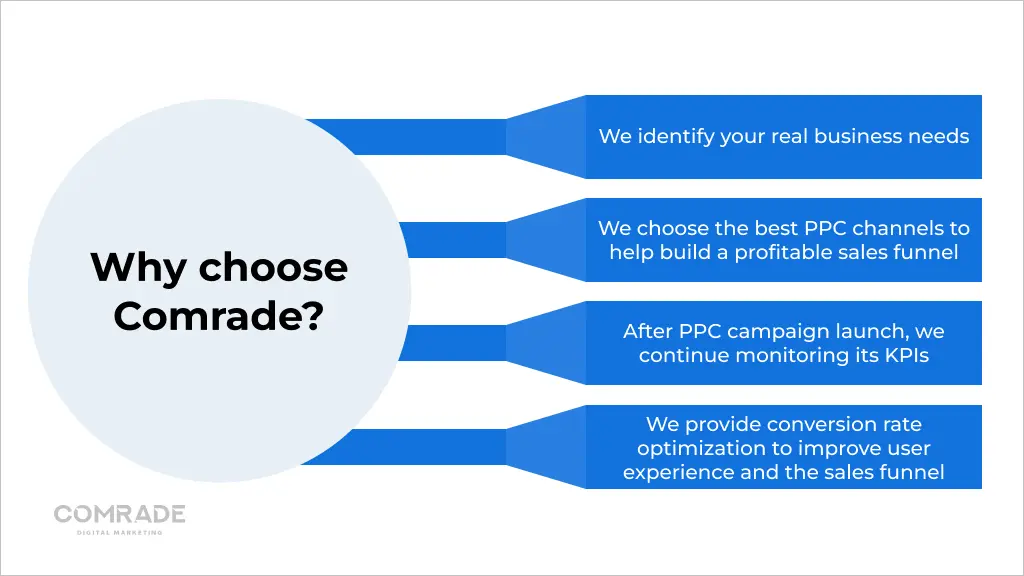
We’re honest: Pay-per-click advertising can be highly competitive and costly if you don’t use professional PPC management services. That’s why we’re here to help create, launch, monitor, and optimize your PPC ads. We strive to bring you customers — not just metrics. The first thing we do is audit your business to identify its real needs and missed opportunities. After we have a solid understanding of its current status and where you want it to be, we’ll choose the best PPC channels to help build a profitable sales funnel. For example, if you’re a service-based company like a law firm or general contractor, we might recommend Local Service Ads. Once we’ve launched your PPC campaigns, we’ll keep close tabs on how customers react to your ads, landing pages, and website, and then provide conversion rate optimization to improve user experience and the sales funnel.
Why Pay-Per-Click Marketing Works for Your Business
When your ad campaigns are managed by a professional PPC advertising agency, your profits will outweigh the cost. PPC ads are a flexible tool. At any time, you can change your bidding and ad strategy, which is why they’re so powerful. PPC advertising is extremely targeted. For example:
- Big law firms can set up ad campaigns for each city or state.
- Home improvement businesses can run local ads to accommodate a 20-50 km radius of their offices.
Our PPC services leverage the targeted capabilities of PPC ads with a flexible, data-driven approach that ensures, at any given moment, you’re always getting the best value for money. The digital space is in constant flux. We help you meet its demands with a flexible and robust sales funnel, specially customized for your business.
How Do You Guarantee I’ll Get More Clients with PPC Advertising?
When we decide to work with your business, we already know we can guarantee results. But don’t just take our word for it. Pay-per-click advertising helps you get more clients because:
- It’s geotargeted according to customer and business locations.
- You can target audiences based on gender, age, interests, and more.
- Its flexible scheduling allows you to show ads at peak times.
- You can create custom offers for different leads.
- Paid search enables better tracking than other forms of advertising.
- The top three posts on SERPs get 46% of clicks. And one of the quickest ways to get there is through search engine advertising.
Why Local PPC Matters & How Comrade Can Help
In a competitive digital market, being seen by the right people at the right time is everything. Local PPC ensures your business appears in front of customers searching in your area — whether they’re in Chicago or across the country. Instead of casting a wide net, local campaigns focus your ad spend where it matters most, reaching high-intent leads ready to call, click, or visit.
How Comrade Can Help
Based in Chicago, Comrade Digital Marketing partners with clients nationwide to run high-performing local PPC campaigns. We specialize in Google Local Service Ads (LSAs): ads that appear at the very top of Google search results and charge you only for actual leads, not clicks. With the added trust of the Google Guarantee badge, LSAs can significantly boost call volume and conversions.
Our Google Local Service Ads Process
- Account Setup & Verification – We handle Google Guarantee requirements for your business.
- Targeting & Service Area Selection – We ensure ads only reach customers in profitable locations.
- Ongoing Optimization – We adjust bids, categories, and messaging for consistent ROI.
- Lead Tracking & Reporting – We measure results so you see exactly what your investment delivers.
No matter where you operate, our team blends Chicago-driven strategy with local market expertise to help you dominate search results, generate more leads, and grow your business efficiently.
Should You Rely on PPC Management Services for Better Results?
Running a PPC campaign can be deceptively simple to start, but incredibly complex to manage. One wrong setting can drain your entire budget in a single day. At Comrade Digital Marketing, based in Chicago and serving clients across the U.S., we combine precision, strategy, and data-driven execution to ensure every click counts — whether you’re in our hometown or anywhere else. If you’re busy running your business, finding the time to monitor and optimize PPC ads is a challenge. While PPC can deliver fast visibility and targeted leads, it requires ongoing adjustments and strategic insight to generate real ROI. That’s where professional PPC management pays off. With Comrade’s PPC management services, you get:
- Optimized Campaign Setup: Avoid costly mistakes with expert configuration.
- Targeted Audience Reach: Focus on clicks most likely to convert.
- Budget Protection: Prevent wasteful spending and improve cost-per-lead.
- Ongoing Optimization: Continuous A/B testing and performance monitoring.
- Data-Driven Decisions: Strategies based on analytics, not guesswork.
Whether you’re a Chicago business looking to dominate the local market or a brand competing nationally, our team ensures your campaigns work harder for every dollar spent. By partnering with Comrade, you save time, protect your budget, and gain a consistent stream of high-quality leads. Smart PPC management is about building a profitable advertising engine. Let us handle the details so you can focus on growth.
Invest in Business-Oriented PPC Campaigns
PPC advertising services allow you to control who sees your business and get higher-quality leads. Whether it’s Local Service Ads, Search Engine Marketing, Google Ads, or any other online PPC campaign, Comrade, a PPC management agency, will create ads perfectly tailored to reach your target audience. Every PPC ads campaign is hand-crafted to include the elements you’re most interested in, so you only spend money on pay-per-click marketing that’s hyper-targeted to reach those who matter. Comrade’s selective approach brings in more sales, not just more leads.
